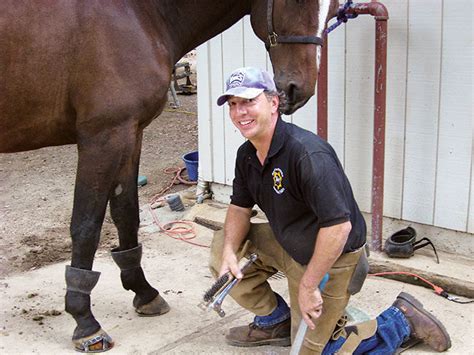Find Your Perfect Farrier Mentorship: Forging a Successful Career
Becoming a skilled farrier requires dedication, hard work, and the right guidance. A mentorship program can significantly accelerate your learning and shape your career. But finding the perfect farrier mentorship isn't about stumbling upon any experienced practitioner; it's about finding a compatible partnership that fosters your growth and aligns with your goals. This article will guide you through the process, helping you identify the qualities of a great mentor and strategies for securing a successful mentorship.
What Makes a Great Farrier Mentor?
Choosing a mentor is a crucial decision. Your mentor will be your guide, advisor, and sometimes even a friend, profoundly impacting your professional trajectory. Therefore, it's essential to look beyond just experience and consider these crucial qualities:
-
Experience and Expertise: This is foundational. Your mentor should possess extensive experience in various farrier techniques, dealing with diverse hoof types and breeds of animals. Look for someone with a strong track record and possibly certifications or advanced training.
-
Teaching Ability and Patience: A skilled farrier isn't automatically a great teacher. The ideal mentor is patient, able to explain complex concepts clearly, and adapt their teaching style to your learning pace. Observe their interactions with apprentices or clients – do they communicate effectively and calmly?
-
Commitment and Availability: Mentorship is a time investment. Ensure your potential mentor has the time and willingness to dedicate to your training. Discuss the frequency and duration of sessions upfront to set realistic expectations.
-
Shared Values and Philosophy: Consider the mentor's approach to farriery. Do their values align with yours regarding animal welfare, ethical practices, and professional standards? A shared philosophy creates a stronger, more productive mentorship.
-
Networking Opportunities: A good mentor can introduce you to their professional network, opening doors to further learning, collaborations, and future career prospects.
How to Find Your Perfect Farrier Mentor?
Finding the right mentor requires proactive effort and strategic networking. Here's a structured approach:
-
Attend Farrier Schools and Workshops: These events are excellent opportunities to observe different farriers and engage with potential mentors. Don't hesitate to introduce yourself and express your interest in mentorship.
-
Network within the Farrier Community: Attend farrier associations' meetings, conferences, and local gatherings. These events provide opportunities to connect with experienced professionals and learn about potential mentorship opportunities.
-
Online Research and Social Media: Explore online farrier forums, social media groups, and websites. Many experienced farriers share their expertise and may be open to mentoring.
-
Reach Out Directly to Farriers You Admire: Identify farriers whose work you respect and whose philosophy aligns with yours. Prepare a brief, professional email expressing your interest in learning from them and outlining your experience and aspirations.
Frequently Asked Questions (FAQs)
Here are some common questions aspiring farriers have about finding the perfect mentor:
How long does a farrier mentorship typically last?
The duration of a farrier mentorship varies greatly. It could range from a few months to several years, depending on your learning progress and the mentor's availability. Open communication about expectations is key.
What are the typical responsibilities of a farrier apprentice?
Apprentices typically assist with various tasks, including preparing tools, cleaning hooves, observing shoeing techniques, and gradually taking on more responsibilities under supervision. The exact tasks will depend on your experience level and your mentor's approach.
How much does a farrier mentorship cost?
The cost varies widely. Some mentors may offer mentorship for free, while others might charge a fee based on the time commitment and level of instruction provided. Discuss financial arrangements transparently upfront.
What if my mentor and I disagree on a particular technique?
Open communication is vital. A good mentor will be open to discussion and will explain their rationale. However, if significant disagreements persist and compromise your learning or ethical values, reassess the mentorship.
Is a formal agreement necessary for a farrier mentorship?
While not always mandatory, a written agreement outlining roles, responsibilities, expectations, and any financial arrangements can be beneficial for both parties, ensuring clarity and avoiding misunderstandings.
Finding the perfect farrier mentorship is an investment in your future. By employing a thoughtful and proactive approach, you can identify a mentor who will guide you towards a rewarding and successful career in this demanding yet fulfilling profession. Remember, the right mentor is more than just a teacher; they're a catalyst for your growth and a valuable professional ally throughout your journey.

